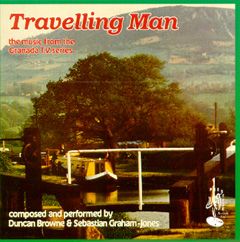
Travelling Man
1984
Duncan Browne and Sebastion Graham-Jones
with guest musicians:
Malcolm Duncan
Nic Potter
Max’s Theme
Steve’s Theme
Lament For Billie
Andrea’s Theme
Berceuse
The Family
Winter
The Chase
Day For Night
Morag
Zoot
Travelling Man
Old Flames
The album of the music from the Granada TV series “Travelling Man” came about through a series of associations, coincidences, happy accidents and probably divine interventions.
Duncan Browne and I had been very close colleagues, collaborators and friends since the late sixties, in which time he contributed to some of my work at the National Theatre. When I joined Granada Television in the early eighties, one of the first experiments I got involved in was an early video version of his beautiful song “China
Girl”. Granada noticed it. I was invited to set up, cast and direct the pilot of “Travelling Man” with my great friend Leigh Lawson in the leading role. Roger Marshall, the author — and a magnificent one — and I had clear ideas about it all, but, largely due to my own inexperience, the pilot was not really right.
I asked Roger whet the music should be like. After a long pause, he said, “It should be lonely. Like a guy amusing himself, … blowing across an empty milk-bottle … a bit haunted, but not sentimental. Hard somehow.”
I went to Duncan and showed him the “not-very-good” pilot episode. I suggested nothing, but he loved the look and style of Leigh Lawson and Roger’s dramatic ideas. He swooped on it, and not much more than a week later, we shot into a studio and spun out six, perhaps even ideas for a new theme. By an amazing coincidence, he had stumbled over a new sound on his synthesizer. There we were and that was it. The twelve string pad and this pan-pipe. It was perfect.
Entirely his idea. Serendipity, I think… Music was written for every scene, every shot, in the thirteen part series. Probably with mature hindsight, too much. We learned to economize later on, but the tunes, the orchestrations, the atmospheres kept coming. Apart from Nic Potter, with his bass, we played everything, confusing the Granada music department because there were no “scores” to examine — everything was in our own notebooks and heads; everything was recorded to picture, tailored to each moment on the screen. It was an extraordinary creative burst; Duncan writing away, discovering new textures and techniques, me directing actors, cameras and stories, rendezvousing with Duncan and then joining into the musical contribution, which he led, brilliantly, intuitively and wittily.
Enter Eaton Music — Terry and Mandy Oates. Roger Watson introduced us and another amazing close and formative relationship was born. The album you have in your hand was the start of it all.
A deal was done, and it was a hard one. Duncan and I retired into a kind of “purdah” in Hackney constructed a ruthless rehearsal schedule, and did three weeks mind buckling work revisiting, remembering, working everything we’d done for the series. We edited, cut, rebuilt, refined and practiced. We went into Lillie Yard with the astonishing Austin Ince, Nic Potter and Malcolm Duncan.
Ten day later, having worked an unfamiliar 10am to 6pm ‘office’ schedule, the album was finished, on budget and in time. Thank you, Emma, Susan, and Lin.
Every now and then, I hear bits of it in airports, restaurants, other people’s cars. Extraordinary…
I hope everyone whoever hears any of it gets at least same of the pleasure that we had making it.
Tragically, ludicrously, Duncan died in May 1993. This album was the beginning of a new and subsequently remarkable career for him, sadly curtailed. I am more proud than I can easily express to have contributed it.
Sebastian Graham-Jones
December 1994
dear sir
I love this serial and very good performance by roger marshall.
please send me the urgently and complete original theme track of the traveling man.Then you will send me the original theme and then I will download.
thanks
faheem ejaz
dear sir
please send me the urgently and complete original theme track of the traveling man.Then you will send me the original theme and then I will download.
thanks
faheem ejaz
great music,great series.someone put it on dvd please..
This album was very difficult for me. The synthesiser and drumcomputers in it was not that what I expect to hear in Duncan. The accoustic work, his guitarplaying does. Nevertheless, the album does bring back memories, does paint pictures and overall the album his guitarplaying comes to a climax. The hell breaks lose. You can hear him moving his fingers fast over the strings, a snif, tension, faster, all in melody and the synthesiser dims… amazing…
This album and the tv program were a focal point in my life – it really had an influence on how i now view the 80’s. A marvelous and evocative selection of music – which will always have great meaning for me and remind me of a time when life was a little less fraught.